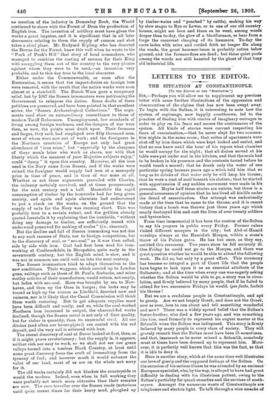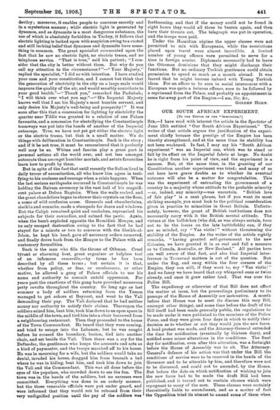LETTERS TO THE EDITOR.
THE SITUATION AT CONSTANTINOPLE.
[To THE EMT= OF THE " SPECTATOR.1
Sin,—Perhaps you will allow me to supplement my previous letter with some further illustrations of the oppression and obscurantism of the regime that has now been swept away. To begin with the Sultan, it is interesting to note how the system of espionage, now happily overthrown, led to the practice of feeding him with stories of imaginary outrages in order to play on his fears and secure the continuance of the system. All kinds of stories were current respecting his fears of assassination,—that he never slept for two consecu- tive nights in the same room; that suites of apartments were shut off by iron doors which were kept locked and sealed, and that no one knew until the hour of his repose what chamber he would occupy for the night ; that all dishes served at his table were put under seal in the kitchen, and that the seals bad to be broken in his presence and the contents tasted before he would touch a morsel; that he drank only the water of one particular spring because years ago a witch told him that so long as he drinks of that water only he will keep his throne; that he wore a coat of mail beneath his clothes ; that he started with apprehension if any sudden movement were made in his presence. Maybe half these stories are untrue, but there is a general consensus of opinion that he has lived all his life under the dread of assassination. One attempt was undoubtedly made at the time that be came to the throne, and it is recent. history that a bomb was thrown just three years ago which nearly destroyed him and cost the lives of over twenty soldiers and bystanders.
From time immemorial it has been the custom of the Sultan to say his prayers in public every Friday. Former rulers visited different mosques in the city; but Abd-ul-Hamid worships always at the Hamidieh Mosque, within a stone's throw of his Palace gates. He has but once, as they say, omitted this ceremony. Two years since he fell seriously ill. One Friday he could not go to the Mosque, and there was great question whether be would be able to attend the following. week. He did so, but only by a great effort. This ceremony has become so integral a part of Court life that the people have began to look upon it as an essential attribute of the Sultanate; and at the time when every one was eagerly asking whether the Sultan would be able to go, a story was in circu- lation, and firmly believed by many people, that if he failed to attend for two successive Fridays he would, ipso facto, forfeit his throne !
But we are a credulous people in Constantinople, and apt- to gossip. Are we not largely Greek, and does not the Greek, now as ever, love to run about and tell something wonderful and new ? There was a widely spread belief that the Sultan's foster-brother, who died a few years ago, and was something like him, used formerly to represent his august master at the Selamlik when the Sultan was indisposed. This story is firmly believed by many people in every class of society. They will gravely remark that the Sultan must have been ill sometimes, and that, inasmuch as he never missed a Selamlik, somebody must at times have been dressed up to represent him. More- over, it is perfectly well known that this was the fact, so that it is idle to deny it.
Here is another story, which at the same time well illustrates our love of gossip and the supposed feelings of the Sultan. On the occasion of his serious illness he was attended by an eminent" European specialist, who, by the way, is alleged to have had great difficulty in dealing with his illustrious patient, owing to the Sultan's partiality for quack remedies and the services of sooth- sayers. Amongst the numerous wants of Constantinople are telephones and electric light. To talk through a wire smacks of
devilry ; moreover, it enables people to converse secretly and in a mysterious manner ; while electric light is generated by dynamos, and as dynamite is a most dangerous substance, the use of which is absolutely forbidden in Turkey, it follows that electric lighting is looked upon with suspicion owing to a rooted and still lurking belief that dynamos and dynamite have some- thing in common. The great specialist commented upon the fact that he saw no electric light, no electric trams, and no telephone service. " That is true," said his patient; " I con- sider that the city is better without them. But why do you call my attention to the circumstance P "—" Your Majesty," replied the specialist, "I did so with intention. I have studied your case and your constitution, and I cannot but think that the generation of electricity in the city on a large scale would improve the quality of the air, and would sensibly contribute to your good health."—" Thank you," remarked the Padisbah; "I will think over what you say."—" His Imperial Majesty knows well that I am his Majesty's most bumble servant, and only desire his Majesty's well-being and prosperity!" It was soon after this that a concession for lighting by electricity the quarter near Yildiz was granted to a relation of one Palace favourite, and a concession for electrifying the Constantinople tramways was put into the hands of another of the Imperial entourage. True, we have not yet got either the electric light or the electric trams, but that is a small matter. We do things with deliberation in Constantinople. Such is the story ; and if it be not true, it must be remembered that it perfectly well may be so. Whims and fancies play a great part in personal actions all the world over, and not less amongst autocrats than amongst humbler mortals, and astute favourites learn bow to profit by them.
But in spite of the fact that until recently the Sultan lived in daily terror of assassination, all who know him agree in testi- fying to his coolness and courage when a crisis happens. When the last serious earthquake occurred in Constantinople he was holding the Bairam ceremony in the vast hall of his magnifi- cent palace at Dolma Bagtche. When the walls rocked, and the great chandeliers began to shower their crystals on the floor, a scene of wild confusion arose. Generals and chamberlains, sheikhs and eunuchs, made a stampede for doors and windows. But the Caliph remained quiet and unshaken, reproached his subjects for their cowardice, and calmed the panic. Again, when the bomb exploded opposite the Hamidieh Mosque, and he only escaped destruction owing to the fact that he had stayed for a minute or two to converse with the Sheikh-ul- Islam, he kept his bead, gave all necessary orders unmoved, and finally drove back from the Mosque to the Palace with all customary formalities.
Such is the man who fills the throne of Othman. Cruel tyrant or charming host, great organiser or helpless tool of an infamous camarilla,—by turns be has been described by all these terms ; but certain it is that, whether from policy, or fear, or carelessness, or other motive, he allowed a gang of Palace officials to use his name and authority to commit untold oppression. For years past the exactions of this gang have provoked numerous petty revolts throughout the country. So long ago as last summer a body of soldiers returning from the Yemen managed to get ashore at Beyrout, and went to the Vali demanding their pay. The Vali declared that be had neither money nor authority to satisfy their claims. Thereupon the soldiers seized him, beat him, took him down to an open space in the middle of the town, and tied him into a chair borrowed from a neighbouring restaurant. Then they proceeded to the house of the Town Commandant. He heard that they were coming, and tried to es-cape into the Lebanon; but be was caught before he crossed the boundary, beaten, tied into another chair, and set beside the Vali. Then there was a cry for the Defterdar, the gentleman who keeps the accounts and acts as a kind of paymaster, and the troops marched off to his house. He was in mourning for a wife, but the soldiers would take no denial, invaded his house, dragged him from beneath a bed where be was in hiding, beat him, and took him down to join the Vali and the Commandant. This was all done before the eyes of the populace, who crowded down to see the fan. The town was in the bands of the soldiers, but no excesses were
committed. Everything was done in an orderly manner, but the three venerable officials were put under guard, and were informed that they would not be released from their very undignified position until the pay of the soldiers was forthcoming, and that if the money could not be found ill eight hours they would all three be beaten again, and then have their throats cut. The telegraph was put in operation, and the troops were paid.
Under the Hamidian regime the upper classes were not permitted to mix with Europeans, while the restrictions placed upon travel were almost incredible. A limited number of young officers were permitted to serve for a time in foreign armies. Diplomats necessarily had to leave the Ottoman dominions that they might discharge their functions. But no ordinary Turkish gentleman could obtain permission to spend so much as a month abroad. It was feared that he might become imbued with Young Turkish ideas. For an officer to be seen in social intercourse with a European was quite a heinous offence, sure to be followed by a reprimand from the Palace, and probably an appointment in some far-away part of the Empire.—I am, Sir, &c., GOLDEN HORN.











































 Previous page
Previous page